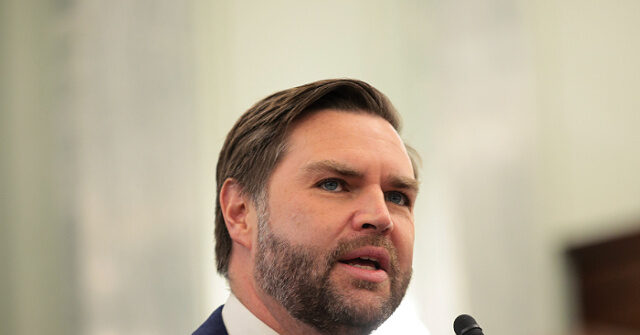JD Vance Slams Media Bias: Tariffs And The 'Bias Of Inaction'

Discover more detailed and exciting information on our website. Click the link below to start your adventure: Visit Best Website. Don't miss out!
Table of Contents
JD Vance Slams Media Bias: Tariffs and the 'Bias of Inaction'
Republican Senator JD Vance has launched a scathing attack on what he terms the media's "bias of inaction," specifically criticizing its coverage of tariffs and their impact on the American economy. Vance, known for his outspoken views and populist appeal, argues that the media's focus often overlooks the potential benefits of tariffs while amplifying negative consequences, creating a skewed narrative that harms informed public debate.
This isn't just another political squabble; it highlights a crucial tension between economic policy and media representation. Vance's critique touches on a broader concern about the role of media in shaping public perception of complex economic issues. Understanding his argument requires examining both his specific claims about tariff coverage and the wider debate around media bias in economic reporting.
Vance's Central Argument: The Unseen Benefits of Tariffs
Vance's core contention centers on what he calls the "bias of inaction." He argues that the media disproportionately focuses on the potential downsides of tariffs – increased prices for consumers, retaliatory tariffs from other countries – while neglecting or downplaying their potential upsides. He believes this selective reporting creates a false impression that tariffs are inherently negative, hindering a balanced discussion of their potential to protect American industries and jobs.
He points to specific examples, though he hasn't explicitly detailed them in a singular statement, likely referencing instances where the negative impacts of tariffs were heavily publicized while the potential for bolstering domestic manufacturing or reducing reliance on foreign goods received less attention. This selective focus, he argues, prevents a nuanced understanding of the complex trade-offs involved in tariff policy.
The Broader Issue: Media Bias in Economic Reporting
Vance's criticism extends beyond tariffs to encompass a broader concern about media bias in economic reporting. Many economists and political scientists have debated the extent to which media coverage shapes public opinion on economic issues. Some argue that media outlets, often driven by deadlines and the need for compelling narratives, simplify complex economic realities, potentially leading to misinterpretations and uninformed public discourse. Others contend that the media accurately reflects the prevailing economic consensus, even if that consensus is subject to debate.
This debate is crucial because public understanding of economic issues directly influences policy decisions. If the media consistently presents a skewed view of economic policies like tariffs, it could lead to a misinformed electorate and ultimately, suboptimal policy choices.
Counterarguments and Further Considerations
While Vance's criticism resonates with some, it's crucial to acknowledge counterarguments. Critics might argue that the media's focus on the negative consequences of tariffs is justified, given the potential for harm to consumers and the broader economy. Furthermore, the economic effects of tariffs are often debated among experts, making it challenging for the media to present a completely unbiased perspective. The complexity of international trade and the interplay of various economic factors make it difficult to draw simple conclusions about the effectiveness of tariffs.
Ultimately, understanding the impact of tariffs requires a careful examination of both their potential benefits and drawbacks. Vance's criticism serves as a reminder of the importance of media literacy and the need for consumers of news to engage with diverse perspectives and critically evaluate information before forming opinions on complex economic issues. This requires seeking out multiple sources and understanding the potential biases inherent in any reporting.
Call to Action: Engage in thoughtful discussion about the role of tariffs and the media's portrayal of economic policy. What are your thoughts on Senator Vance's claims? Share your perspective in the comments below.

Thank you for visiting our website wich cover about JD Vance Slams Media Bias: Tariffs And The 'Bias Of Inaction'. We hope the information provided has been useful to you. Feel free to contact us if you have any questions or need further assistance. See you next time and dont miss to bookmark.
Featured Posts
-
Jimmy Butler Rumores De Transferencia Para Os Warriors Apos Polemica Com O Heat
Feb 06, 2025
-
Deputado Municipal Do Chega Investigado Por Prostituicao De Menores
Feb 06, 2025
-
Patto Di Stabilita Piu Flessibilita Per Aumentare La Spesa Difesa Comune
Feb 06, 2025
-
Sheffield School Stabbing Community Mourns 15 Year Old Victim
Feb 06, 2025
-
Gisele Buendchen Und Tom Brady Ein Neuer Anfang Nach Der Trennung
Feb 06, 2025
